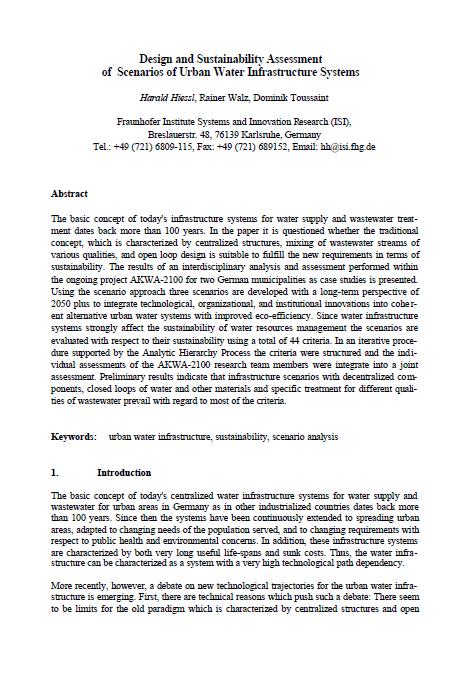Design and Sustainability Assessment of Scenarios of Urban Water Infrastructure Systems - Conference proceedings
Hiessl, H., Walz, R., Toussaint, D. (2001)

Published in: 2001
Author:
Hiessl, H., Walz, R., Toussaint, D.
Uploaded by:
SuSanA secretariat
Partner profile:
common upload
4099 Views
59 Downloads
This library entry is proceedings of 5th International Conference on Technology Policy and Innovation, Utrecht: Lemma
Content - Summary
The basic concept of today's infrastructure systems for water supply and wastewater treatment dates back more than 100 years. In the paper it is questioned whether the traditional concept, which is characterized by centralized structures, mixing of wastewater streams of various qualities, and open loop design is suitable to fulfill the new requirements in terms of sustainability. Using the scenario approach three scenarios are developed with a long-term perspective of 2050 plus to integrate technological, organizational, and institutional innovations into coherent alternative urban water systems with improved eco-efficiency. Since water infrastructure systems strongly affect the sustainability of water resources management the scenarios are evaluated with respect to their sustainability using a total of 44 criteria. Preliminary results indicate that infrastructure scenarios with decentralized components, closed loops of water and other materials and specific treatment for different qualities of wastewater prevail with regard to most of the criteria.
Bibliographic information
Hiessl, H., Walz, R., Toussaint, D. (2001). Design and Sustainability Assessment of Scenarios of Urban Water Infrastructure Systems - Conference proceedings.
Filter tags
Case studies in other formats English Europe & Central Asia Urban (entire city)















